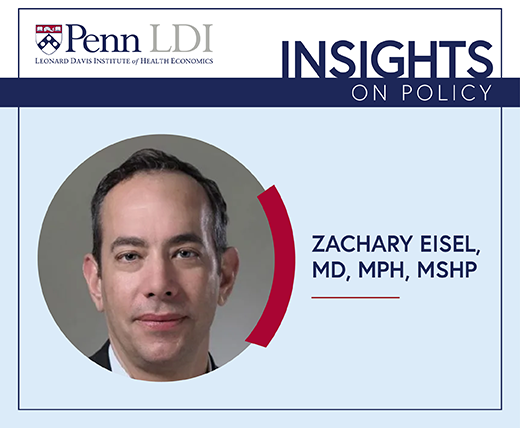
Estimated Overdose Deaths Due to the Loss of MOUD in the One Big Beautiful Bill Act
Research Memo: Delivered to House Speaker Mike Johnson and Majority Leader John Thune
News
LDI Senior Fellow and Associate Professor of Emergency Medicine at the Perelman School of Medicine Eugenia South, MD, MSHP, has been named Penn Medicine Associate Vice President for Health Justice and Director of the New Center for Health Justice. Situated within Penn Medicine, the new center will collaborate across the University of Pennsylvania Health System, the Perelman School of Medicine, and the larger University.

“The Center for Health Justice seeks to enable health through racial, economic, and environmental justice for Black, Brown, and all populations and neighborhoods harmed by structural inequity,” said Health System Chief Executive Officer Kevin B. Mahoney in his announcement.
The center will work in close association with the Penn Urban Health Lab, where South has served as Faculty Director since 2020. The stated goal of the center is “to work with the leadership, staff, and stakeholders to infuse concepts of justice into all aspects of health system operations,” said Mahoney.
South, the former Vice Chair for Inclusion, Diversity, and Antiracism in the Department of Emergency Medicine, is a physician scientist known for her research work focused on improving the health and quality of life for residents in low-resource and Black communities.
She has drawn national acclaim for her pioneering work developing and testing individual and neighborhood-level interventions to better understand the ways in which the built environment where people live, work, and play influences their physical and wellbeing. Much of her research has focused on analyzing how “greening” vacant lots and other place-based interventions can promote safer communities.
In a recent Washington Post commentary, South explained, “A simple, low-cost, structural change to the neighborhood environment can improve safety and foster well-being. Our research has demonstrated that turning vacant land into clean and green space reduces gun crime. People living nearby feel safer and less depressed, and they forge deeper social connections with their neighbors. In fact, some residents reclaim these spaces for social activities such as barbecuing and gardening.”
Her work in this field has been widely published in scientific and general media outlets including JAMA Network Open, Proceedings of the National Academy of Sciences (PNAS), the American Journal of Public Health, the Washington Post, NPR, and Time Magazine.

Research Memo: Delivered to House Speaker Mike Johnson and Majority Leader John Thune

Research Memo: Delivered to House Speaker Mike Johnson and Majority Leader John Thune

Hospitals’ Current Cost Reports are Unreliable and Should be Improved, LDI Fellow Finds

If Federal Support Falls, States May Slash Home- and Community-Based Services — Pushing Vulnerable Americans Into Nursing Homes They Don’t Want or Need

Historic Coverage Loss Could Cause Over 51,000 People to Lose Their Lives Each Year, New Analysis Finds

Cited for “Breaking New Ground” in the Field of Hospital Operations